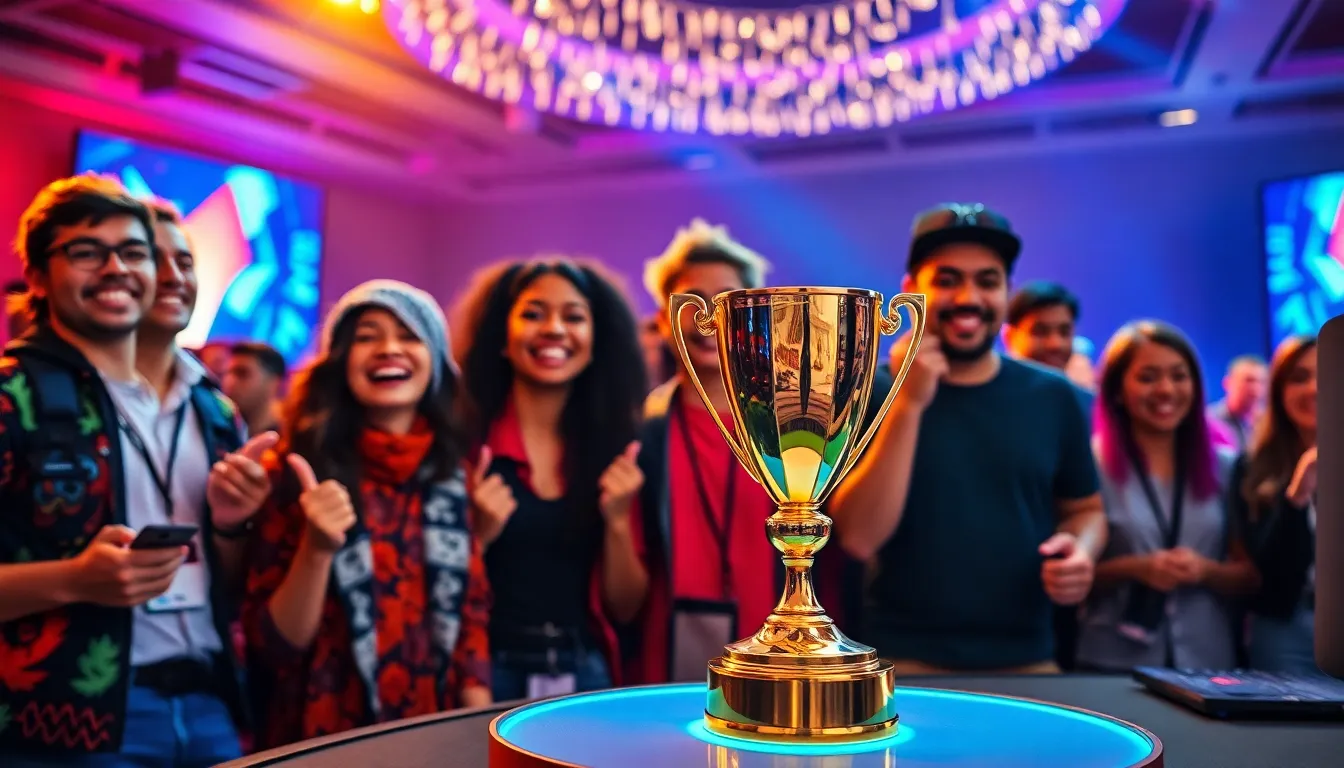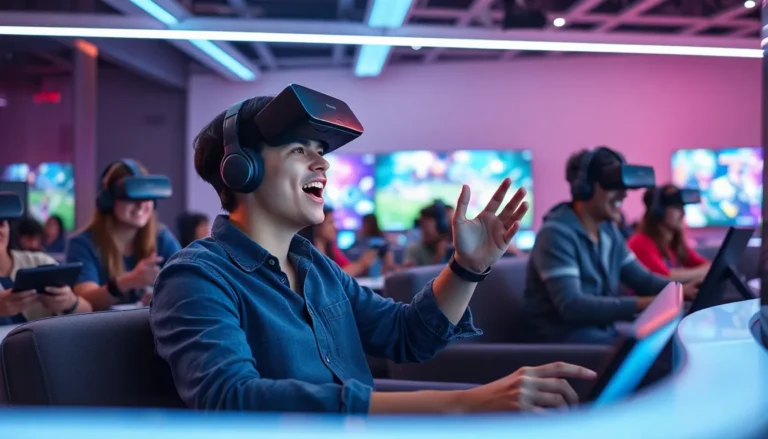Table of Contents
ToggleIn the world of gaming, nothing sparks excitement quite like the annual game awards. It’s that glorious time when developers, players, and critics gather to celebrate the best of the best. Picture this: dazzling lights, heart-pounding performances, and the thrill of watching your favorite game snag that coveted trophy. Who doesn’t love a good underdog story, especially when it involves pixelated heroes and epic quests?
Overview Of Game Awards Coverage
Game awards coverage captures essential moments from the event, providing insights into nominees and winners. Reporters highlight key categories such as Game of the Year, Best Game Direction, and Best Narrative. Many outlets create live blogs, offering real-time updates and reactions from fans and industry leaders.
During the event, commentators discuss game development trends, new technologies, and influential creators. Coverage often includes interviews with nominees and winners, shedding light on their experiences and inspirations. Social media plays a significant role, amplifying announcements and allowing fans to engage directly with the event.
Special segments focus on world premieres, showcasing upcoming titles that generate buzz in the gaming community. Viewers appreciate the behind-the-scenes access, which provides context to the glitz and glamour of the awards. Editors curate special highlight reels, featuring emotional acceptance speeches and memorable moments, enhancing viewer engagement.
Media outlets utilize various formats to reach diverse audiences. Articles, podcasts, and video recaps provide multiple ways to experience the event. Interactive elements, such as polls and quizzes, allow fans to express their opinions on nominees and categories.
Metrics showcase the reach of game awards coverage. In 2022, viewership peaked at 85 million, confirming the event’s significance. Coverage of the awards highlights the dedication of gamers, developers, and publishers, fostering a stronger community spirit within the industry.
Importance Of Game Awards

Game awards hold significant value in the gaming industry. They not only celebrate achievements but also foster community engagement.
Recognition For Developers
Recognition serves as a powerful motivator for developers. Awards highlight creativity, innovation, and hard work in game production. Acknowledgment from peers reinforces industry standards. Winning prestigious awards can elevate a developer’s reputation. It can inspire them to push the boundaries of game design further. Participation in these award events often leads to networking opportunities, enhancing future collaborations. In addition, smaller studios frequently gain visibility through nomination, empowering them to compete alongside larger entities.
Impact On Game Sales
Game awards directly influence sales figures. Titles that win or are nominated frequently see spikes in their sales post-event. According to data, award-winning games can increase sales by up to 200%. Such accolades serve as endorsements, attracting new players. Highlighting excellence in categories like Game of the Year brings additional interest. Retailers often promote award-winning titles prominently, enhancing visibility. Additionally, players seek out recognized games for assurance of quality in their purchases.
Types Of Game Awards
Various types of game awards celebrate achievements in the gaming industry, acknowledging both creativity and community engagement. These awards fall into two primary categories: industry awards and fan-voted awards.
Industry Awards
Industry awards highlight the expertise and craftsmanship of gaming developers. Specific ceremonies, such as The Game Awards and the BAFTA Game Awards, focus on recognizing excellence based on critical evaluations from respected industry professionals. Nominations in categories like Game of the Year, Best Game Direction, and Best Art Direction stem from rigorous selection processes. These awards often influence market trends and set benchmarks for quality, with winners receiving acclaim that can lead to increased visibility and potential sales boosts. In 2022, award-winning titles frequently saw sales increases of up to 200%, emphasizing the tangible impact of recognition on a game’s success.
Fan-Voted Awards
Fan-voted awards celebrate community involvement and player preferences. Events like the Golden Joystick Awards empower gamers by allowing them to cast votes for their favorite titles, developers, and innovations. These awards reflect popular opinion and foster a sense of connection between developers and their audience. By inviting user participation, these ceremonies create excitement and engagement within the gaming community. Many fans share their experiences on social media, amplifying discussions and enhancing the visibility of nominated games. Popular games often receive significant boosts in exposure and sales after being recognized in these awards, anchoring their status in the gaming landscape.
Recent Game Awards Coverage Highlights
The latest game awards delivered excitement, showcasing major wins and surprising upsets. Extensive coverage captured the pulse of the event.
Major Winners And Losers
Key winners included Game of the Year recipient Elden Ring, which dominated multiple categories. God of War Ragnarök followed closely, earning several awards for its narrative and design. On the other hand, titles like Forspoken and Avowed did not receive the recognition many expected, highlighting the unpredictable nature of the awards. Recognizing talent from indie studios further enriched the spotlight, with Stray securing awards for its innovation, making it a standout amidst larger contenders.
Notable Presentations And Announcements
Exciting presentations featured highly anticipated games. Final Fantasy XVI showcased a stunning trailer, generating significant buzz among fans. Last year’s audience favorite, Hades II, revealed new gameplay mechanics and characters, prompting applause. Surprise announcements included a sequel to The Legend of Zelda: Breath of the Wild, drawing widespread excitement. Interactive segments encouraged viewer participation, with gameplay demos allowing fans to experience new titles firsthand and heightening the sense of community engagement during the event.
Analysis Of Media Coverage
Game awards coverage reveals the multifaceted approach media outlets take to engage audiences.
Influence Of Social Media
Social media plays a critical role in shaping discussions about game awards. Instant updates from platforms like Twitter and Instagram keep fans informed of nominees and winners. Engagement spikes during announcements as fans share reactions, insights, and memes. Many gaming personalities amplify highlights, fostering community dialogue. Metrics from recent awards show that social media interactions peaked, which illustrates its crucial function in audience participation. Platforms also serve as a space for real-time reactions, making the event feel more immediate and interactive. Consequently, developers benefit from increased visibility and interaction with potential players.
Role Of Streamers And Influencers
Streamers and influencers significantly impact the game awards landscape. Many host watch parties that draw thousands of viewers, amplifying the event’s reach. Their commentary and live reactions create a communal viewing experience, enhancing excitement. Major streamers often feature interviews with nominees, providing unique insights into behind-the-scenes stories. Metrics reveal that streams related to award events attract immense traffic and engagement. This connection helps viewers feel more involved in the outcomes, solidifying relationships between developers and their audience. The overall effect boosts awareness for games recognized during these events, leading to increased sales and community interest.
Game awards coverage plays a crucial role in celebrating the achievements within the gaming industry. It not only highlights the exceptional talent of developers but also fosters a sense of community among players. The excitement generated during these events resonates across various platforms, engaging fans and amplifying discussions.
As the gaming landscape continues to evolve, the impact of these awards remains significant. They serve as a benchmark for quality and innovation while providing visibility for both established and indie titles. The dynamic interaction between developers and their audience during these events strengthens relationships and drives enthusiasm for future releases. Ultimately, game awards coverage is essential for recognizing excellence and advancing the gaming culture.







